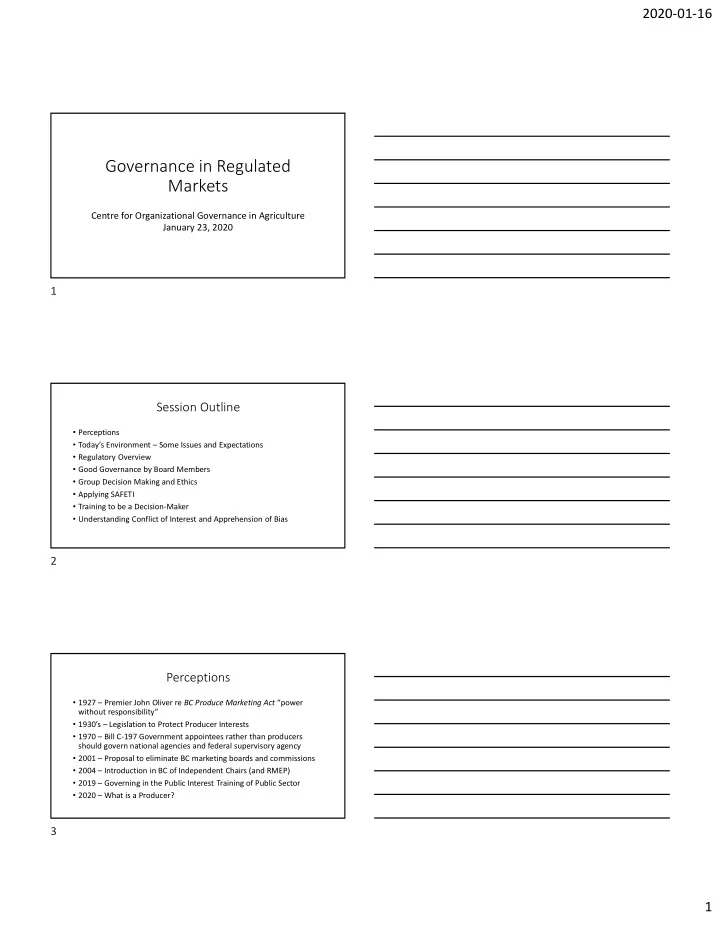

2020-01-16 Governance in Regulated Markets Centre for Organizational Governance in Agriculture January 23, 2020 1 Session Outline • Perceptions • Today’s Environment – Some Issues and Expectations • Regulatory Overview • Good Governance by Board Members • Group Decision Making and Ethics • Applying SAFETI • Training to be a Decision-Maker • Understanding Conflict of Interest and Apprehension of Bias 2 Perceptions • 1927 – Premier John Oliver re BC Produce Marketing Act “power without responsibility” • 1930’s – Legislation to Protect Producer Interests • 1970 – Bill C-197 Government appointees rather than producers should govern national agencies and federal supervisory agency • 2001 – Proposal to eliminate BC marketing boards and commissions • 2004 – Introduction in BC of Independent Chairs (and RMEP) • 2019 – Governing in the Public Interest Training of Public Sector • 2020 – What is a Producer? 3 1
2020-01-16 Today’s Environment - Some Issues and Expectations • “must operate in the present but anticipate the future” (Gaetan Lussier) • Complexity and Pace. • Connectivity. • Tough and necessary decisions vs. satisfying all parties – is keeping things quiet an impediment to good decision-making? • Diversity. 4 Regulatory Overview • Historical Snapshot • Natural Products Marketing (BC) Act ( NPMA ) • NPMA Regulations • Schemes • Agricultural Products Marketing Act (Canada) • BC Farm Industry Review Board and Its Role • Ministry of Agriculture Regulated Marketing Economic Policy • BC Farm Industry Review Board Governance Expectations 5 BCFIRB Governance Expectations • Board Governance in the Public Interest • Financial Responsibility and Accountability • Stakeholders Experience / Producer Consultation and Involvement • Sound Decision Making / Sound Marketing Policy - SAFETI • Performance Targets and Measures 6 2
2020-01-16 Good Governance by Board Members Fiduciary Duties • Honesty Duty – act with honesty, good faith and in best interests of the Board. • Loyalty Duty – work exclusively in best interests of the Board and avoid conflicts of interest. • Care Duty – act diligently and prudently based on common sense and ethical values. • Diligence Duty – be informed in order to enquire properly about management of the Board’s affairs – assessing risk. • Skill Duty – experience, skills of members. • Prudence Duty – act carefully, assess consequences–good, bad, indifferent. 7 Good Governance by Board Members Must Do Well • Determine Core Purpose and Core Values (within NPMA /Scheme). • Approve Major Goals and Desired Results. • Maintain Standing Policies on All Aspects of Governance. • Select an Executive Director and Hold Accountable to Policies. • Ensure Financial Solvency and Integrity. • Require Periodic External Audits. • Help Represent Board. • Encourage and Nurture Executive Director and Staff. • Final Resolution of Internal Disputes. • Evaluate and Improve Board. 8 Group Decision Making Guiding Principles and Ethics • Respectful to each other in all contexts – all must have a voice. • Address and resolve conflicts quickly – but don’t avoid all conflict. • Prepared and informed to timely address issues relevant to agenda. • Support final decision – resign if don’t. • Honesty – volunteer conflicts/potential conflicts, no personal agenda. • Confidentiality. • No authority outside of the Board except as assigned. • Collective discipline. Hold one another accountable. 9 3
2020-01-16 Applying SAFETI • Strategic – Identifying key opportunities and systemic challenges, and plan for actions to effectively manage risks and take advantage of future opportunities. • Accountable – Maintaining legitimacy and integrity through understanding and discharging responsibilities and reporting performance. • Fair – Ensuring procedural fairness in processes and decision making. • Effective – Ensuring clearly defined outcomes with appropriate processes and measures. • Transparent – Ensuring that processes, practices, procedures, and reporting on how the mandate is exercised are open, accessible and fully informed. • Inclusive – Ensuring that appropriate interests, including the public interest, are considered. 10 Training to be a Decision-Maker • Registered Producers are licence holders – responsibility to know? • Associations, Agencies, Committees (pre-board, succession planning) • Initial Orientation as Board Member • Centre for Organizational Governance in Agriculture • Specific – e.g., January 23, 2020 Session • General Knowledge – not just COGA – continuous improvement • BC Council of Administrative Tribunals – COGA Specific • Justice Institute (Conflict Resolution) • Collective and Individual – balance on board 11 Understanding Conflict of Interest and Apprehension of Bias • Conflict of Interest – is a particular type of reasonable apprehension of bias arising where a Board member’s personal financial interest, business interest or the financial interest of a family member, conflicts with the required duty of decision-making. • Apprehension of Bias – where an informed person would reasonably perceive, in all the circumstances, that a decision-maker would not be impartial because of personal, financial interest, past or present associations or based on current or previously expressed views with respect to an issue. 12 4
2020-01-16 Conflict of Interest and Apprehension of Bias (contd) • Indirect Interest – family, partnership, director, shareholder, etc. • Private Interest – direct or indirect interest in a contract or transaction (or potential one) of the Board or a matter being considered by the Board but does not include something that: • has application to general public • affects a Board member as one of a broad class (e.g., registered producers generally) • Concerns remuneration and benefits of Board members. • Insider Information, Influence, Gifts and Benefits 13 Procedure on Conflict of Interest or Apparent Conflict of Interest • Board member’s responsibility to disclose fully and promptly. • Withdraw from meeting/decision-making without voting or participating in the consideration of the matter. • Refrain from any action intended to influence the discussion or vote. • Implications….managing in practice. 14 Questions ? 15 5
Recommend
More recommend